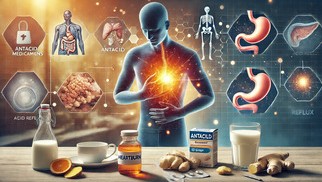Heartburn: Understanding the Causes, Symptoms, and Treatment


Heartburn is a common condition experienced by millions of people worldwide. While typically not a sign of a serious illness, persistent or severe heartburn can disrupt daily life and sometimes indicate underlying health concerns. This article answers key questions about heartburn, including its symptoms, causes, pregnancy-related factors, sudden onset, and potential dangers. Additionally, we’ll discuss how Motilium (domperidone) can be part of the treatment plan.
Heartburn Symptoms
Heartburn symptoms can vary in intensity and frequency, but the hallmark sign is a burning sensation in the chest, typically located behind the breastbone. This discomfort often occurs after eating and may worsen when lying down, bending over, or during the nighttime. The burning pain may be accompanied by a sour or bitter taste in the back of the throat, caused by stomach acid refluxing into the esophagus. Some individuals also experience regurgitation, where partially digested food or liquid rises into the throat or mouth, leaving an acidic aftertaste.
In addition to these primary symptoms, heartburn may manifest in less obvious ways. Chronic or severe cases can lead to a persistent sore throat, a hoarse voice, or a feeling of a lump in the throat (globus sensation). Frequent coughing, particularly at night, can also be associated with heartburn as the acid irritates the airways. Difficulty swallowing, known as dysphagia, is another symptom that sometimes signals damage to the esophagus caused by ongoing acid exposure.
Heartburn may be mistaken for other conditions, such as cardiac-related chest pain. Therefore, it’s essential to pay attention to associated symptoms. Chest pain that radiates to the arm, neck, or jaw, or is accompanied by dizziness, shortness of breath, or sweating, should prompt immediate medical attention to rule out heart problems.
Recognizing and addressing heartburn symptoms early is crucial, as persistent discomfort can signal underlying issues like gastroesophageal reflux disease (GERD) and help prevent potential complications.
What Does Severe Heartburn Feel Like?
Severe heartburn involves a burning or stinging sensation in the chest, often centered behind the breastbone. This discomfort can worsen after eating, lying down, or bending over. Additional symptoms may include a sour or bitter taste in the mouth due to acid reflux and chest pain that mimics heart attack symptoms. In some cases, swallowing becomes difficult, and a persistent cough or hoarseness can develop.
If symptoms occur frequently or worsen, they may indicate gastroesophageal reflux disease (GERD), a chronic condition that requires medical attention. Early diagnosis and treatment are important to avoid complications.
What is Heartburn in Pregnancy?
Heartburn affects up to 80% of pregnant women and often becomes more frequent during the third trimester. This is due to hormonal changes, such as elevated progesterone levels, which relax the lower esophageal sphincter (LES). As a result, stomach acid can flow into the esophagus more easily. Additionally, the growing uterus presses against the stomach, further contributing to acid reflux.
Symptoms include a burning sensation in the chest, an acidic taste in the mouth, and occasional regurgitation of stomach contents. Though uncomfortable, pregnancy-related heartburn is usually temporary and resolves after childbirth. Simple measures like dietary adjustments, eating smaller meals, and using safe antacids can help manage symptoms. However, any medication use during pregnancy should be approved by a healthcare provider.
What Causes Heartburn Everyday?
Persistent heartburn may stem from various lifestyle factors or underlying health conditions. A diet high in spicy, fatty, or acidic foods is a common trigger. Smoking, alcohol use, overeating, and obesity can also contribute, as they weaken the LES and encourage acid reflux. Certain medical conditions, such as GERD or a hiatal hernia, increase the risk of daily symptoms, as do specific medications like NSAIDs or calcium channel blockers.
Addressing chronic heartburn involves lifestyle adjustments, including avoiding trigger foods, eating smaller meals, and maintaining a healthy weight. In cases where lifestyle changes are insufficient, professional medical evaluation is necessary to determine the root cause and appropriate treatment.
Why Do I Have Heartburn All of a Sudden?
Sudden onset heartburn can occur due to unexpected changes in dietary habits, such as consuming foods like coffee, chocolate, or acidic fruits. Overeating or heightened stress levels can also trigger symptoms. Additionally, a new prescription medication or supplement may irritate the stomach lining and cause reflux.
In some cases, unexplained persistent heartburn may point to a more serious condition, such as GERD or an esophageal infection. It’s crucial to seek medical advice if symptoms appear suddenly and are accompanied by significant weight loss, blood in the stool, or vomiting.
Is Heartburn Dangerous?
Occasional heartburn is typically harmless, but chronic or severe cases can lead to complications. Repeated exposure to stomach acid can inflame the esophagus, resulting in esophagitis or scarring that narrows the esophagus, making swallowing difficult. Long-term reflux may also cause Barrett’s esophagus, a condition associated with a higher risk of esophageal cancer.
Additionally, acid entering the respiratory system can lead to aspiration pneumonia or chronic bronchitis. If heartburn disrupts daily life or sleep, medical intervention is essential to mitigate long-term risks.
Treatment with Motilium
Motilium (domperidone) is often prescribed to address nausea, vomiting, and delayed gastric emptying, all of which can contribute to heartburn. By promoting gastrointestinal motility, Motilium reduces pressure on the LES, thereby decreasing the likelihood of acid reflux.
Mechanism of Action
Motilium works by blocking dopamine receptors in the gut, enhancing the digestive system’s efficiency. Food moves through the stomach more quickly, reducing acid build-up and minimizing symptoms like bloating and discomfort.
Best Use Cases for Motilium
This medication is particularly effective when reflux symptoms are tied to slow gastric emptying. Patients who experience nausea, bloating, or difficulty tolerating standard GERD treatments may benefit from Motilium.
Safety Considerations
While Motilium is generally safe and well-tolerated, some individuals may experience mild side effects such as headaches, dry mouth, or dizziness. However, the drug is not suitable for everyone, particularly individuals with heart conditions or severe liver impairments. Pregnant or breastfeeding women should consult their doctor before using this medication.
Motilium’s effectiveness is maximized when combined with lifestyle changes. By addressing both dietary habits and digestive health, patients often experience significant symptom relief.
Conclusion
Heartburn, a widespread yet often manageable condition, can be triggered by various factors, including diet, stress, pregnancy, or chronic conditions like GERD. While occasional discomfort can often be remedied with over-the-counter options, frequent or severe heartburn warrants professional evaluation to rule out complications such as Barrett’s esophagus or esophagitis.
For many patients, Motilium offers a valuable solution, particularly when delayed gastric emptying contributes to symptoms. Nevertheless, all treatments should be used under medical guidance to ensure safety and effectiveness.Proactive management—such as identifying triggers, maintaining a healthy lifestyle, and seeking prompt medical care when necessary—helps reduce heartburn’s impact on daily life and promotes long-term well-being.
Article post: Editorial Team of RXShop.md
(Updated at Jan 14 / 2025)

